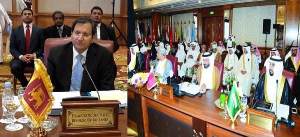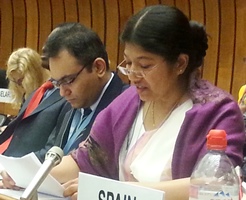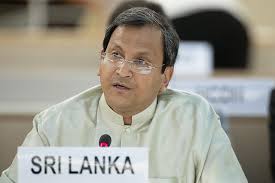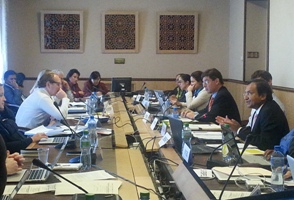
On the invitation of President Mahinda Rajapaksa, His Holiness Pope Francis will pay a State Visit to Sri Lanka from 13th to 15th January 2015. The Government and people of Sri Lanka are looking forward to warmly welcoming His Holiness and his delegation.
All arrangements for the visit are in place and the required constructions are progressing on schedule including the altar at Galle Face Green where the Special Mass and the canonization of Blessed Joseph Vaz, which will take place on Wednesday 14thJanuary.

Ambassador Ravinatha Aryasinha met Archbishop Dominique Mamberti, the Secretary for Relations with States of the Holy See at a luncheon meeting on 6th December 2014 in Bern. The luncheon meeting was organized by Monsignor Diego Causero, Ambassador of Holy See in Bern for diplomats accredited to the Holysee, on the occasion of Archbishop Mamberti’s visit to Switzerland.

A series of initiatives aimed at boosting protection and improving conditions of employment for millions of foreign workers in the Gulf have been agreed upon at the Third Ministerial Consultative Meeting of the Abu Dhabi Dialogue (ADD) comprising Asian countries sending and receiving labour, which concluded in Kuwait last week. The 'Kuwait Declaration' noted that "recognizing that individual government's efforts may fall short, we resolve to work together to prevent and sanction exploitative recruitment practices that place workers at great risk and undermine fundamental rights".
Ministers and Heads of Delegations from Afghanistan, Bahrain, Bangladesh, China, India, Indonesia, Kuwait, Nepal, Oman, Pakistan, the Philippines, Qatar, Saudi Arabia, Sri Lanka, Thailand, United Arab Emirates and Vietnam attended this meeting, held on 26-27 November 2014 under the chairmanship of Kuwait. Sri Lanka's Permanent Representative to the United Nations in Geneva Ravinatha Aryasinha led the Sri Lanka delegation.

Sri Lanka stated that a comprehensive labour migration policy has been developed, with a view to managing labour migration properly and orderly and to ensure dignity, security and equity for Sri Lankan nationals seeking employment abroad. The Government of Sri Lanka has taken concerted efforts in several policy key areas, namely, improving recruitment practices and educating labour agents, pre-departure orientation, empowerment of those migrants who have re-entered the country, facilitating cheaper, faster, and safer transfer of remittances.
Sri Lanka reiterates its supports the adoption of a Declaration which would demonstrate the commitment and efforts of the international community for the promotion and protection of the rights of peasants and other people working in rural areas.
Sri Lanka made this intervention at the First Informal Consultation of the Open-ended Working Group on the UN Declaration on the Rights of Peasants and Other People Working in Rural Areas at the Human Rights Council on 12 November 2014 in Geneva.

Following the News Release yesterday (7 November 2014) by the UN Office of the High Commissioner for Human Rights condemning disinformation designed to discredit the UN investigation on Sri Lanka, the Permanent Representative of Sri Lanka to the UN in Geneva has sent the attached communication to the UN High Commissioner for Human Rights in this regard.

Sri Lanka's Permanent Representative to the UN in Geneva Ravinatha Aryasinha, has said Sri Lanka which took over the chair of the Colombo Process (CP) one year ago was of the view that if it were to make a difference and ensure that some real benefits would accrue to the people of the member countries, it was important that they address the tough issues, including 'Ethical Labour Recruitment Practices'. He noted that in ongoing deliberations the CP is seeking to harmonize existing national regulatory frameworks, promote Standard Employment Contracts (including addressing issue of contract substitution and create a registration mechanism for contracts), consider common minimum wage levels, and conditions that promote health and well-being and insurance protection, and to develop a common position on ethical recruitment practices.
Ambassador Aryasinha made these observations and reviewed the progress made by the CP under Sri Lanka's leadership, when he addressed an Expert Consultation on Recruitment Practices and their Impact on Human Rights of Migrants, held at the Palais des Nations in Geneva on 31 October 2014. The consultation was convened by Mr. Francois Crepeau, Special Repporteur on the Human Rights of Migrants and was attended by diplomats, academics, representatives of the ILO and IOM, Recruitment specialists, as well as NGOs involved in the field.
- Sri Lanka emphasizes commitment to address the issue of 'ethical labour recruitment practices' during its tenure as Colombo Process Chair
- BOI represents Sri Lanka at the World Investment Forum 2014
- Sri Lanka should be judged in proportion to the challenges faced by a country emerging from a 30 year terrorist conflict - Ambassador Aryasinha tells the Human Rights Committee in Geneva
